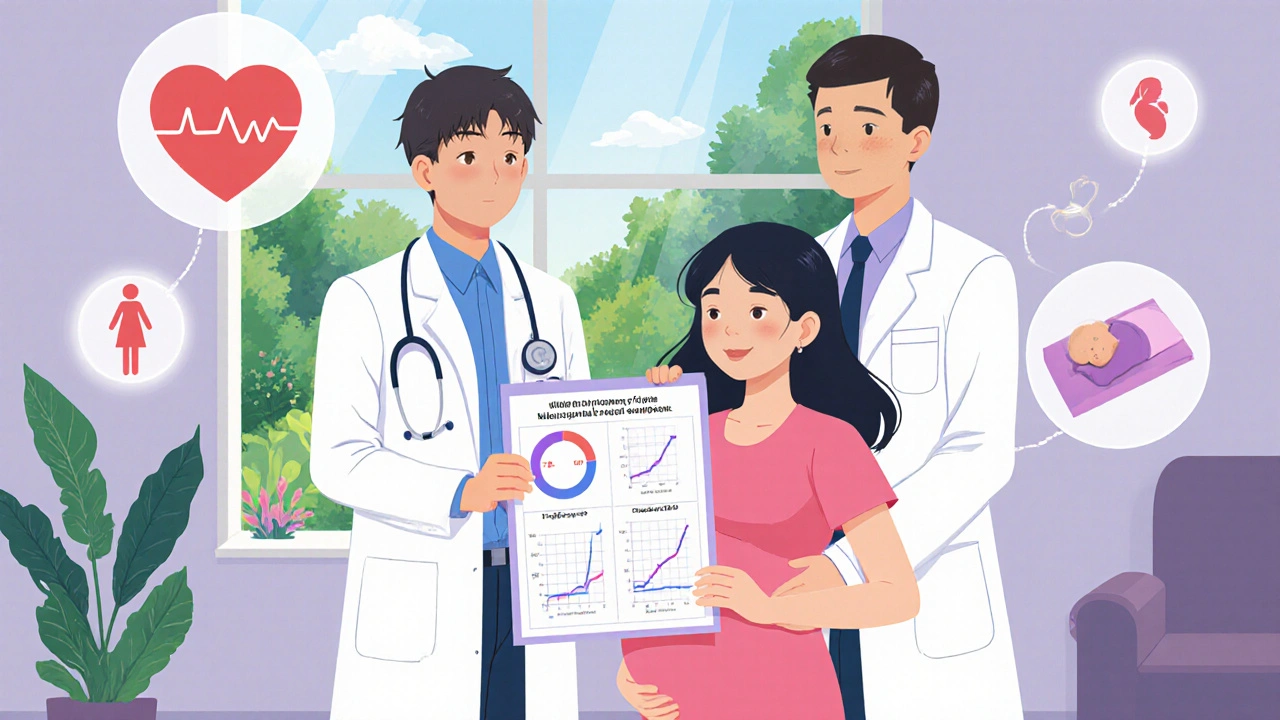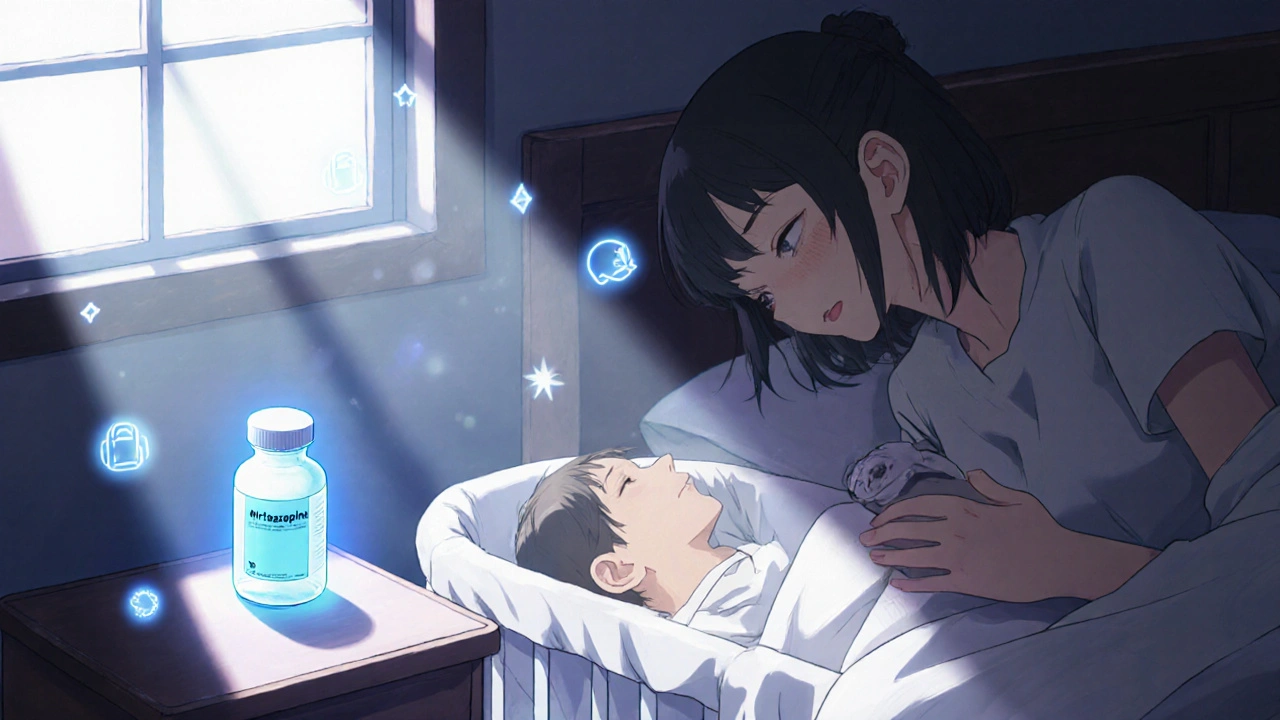
Thinking about taking mirtazapine while pregnant? You’re not alone. Thousands of women manage depression or anxiety during pregnancy, and mirtazapine is one of the medications doctors sometimes recommend. But the big question stays: mirtazapine and pregnancy - is it safe? The answer isn’t yes or no. It’s about weighing real risks against real benefits, and understanding what the data actually shows.
What Is Mirtazapine?
Mirtazapine is an antidepressant, classified as a noradrenergic and specific serotonergic antidepressant (NaSSA). Unlike SSRIs like sertraline or fluoxetine, it works differently in the brain. It boosts levels of norepinephrine and serotonin by blocking certain receptors, which can help lift mood, improve sleep, and increase appetite. Many people find it helpful when other antidepressants cause nausea, sexual side effects, or insomnia.
It’s prescribed for major depressive disorder, generalized anxiety, and sometimes for severe nausea during pregnancy. Brand names include Remeron and Zispin. It comes in tablet form, usually taken once daily at bedtime because it can cause drowsiness. Doses range from 15 mg to 45 mg, depending on the person and their symptoms.
Why Do Women Take Mirtazapine During Pregnancy?
Untreated depression during pregnancy carries serious risks - preterm birth, low birth weight, difficulty bonding with the baby, and even postpartum depression. For some women, the emotional toll of depression is worse than any potential medication risk. If other antidepressants haven’t worked or caused bad side effects, mirtazapine may be considered because it doesn’t typically cause GI upset or sexual dysfunction - two common reasons people stop taking SSRIs.
Some OB-GYNs and psychiatrists prefer mirtazapine in early pregnancy because it’s less likely to cause fetal heart issues compared to certain other drugs. It’s also used when weight loss or poor appetite is a concern, since it often increases appetite and can help with weight gain - which can be helpful in pregnancies where nutrition is already a challenge.
What Does the Research Say About Mirtazapine and Birth Defects?
Large studies tracking thousands of pregnancies exposed to mirtazapine show no clear increase in major birth defects. A 2020 review published in Acta Psychiatrica Scandinavica analyzed data from over 1,500 pregnancies and found no consistent pattern of congenital anomalies linked to mirtazapine use. The overall risk of major malformations stayed within the baseline rate of 2-4% seen in the general population.
One small study from 2017 looked at 107 pregnancies and found one case of a heart defect - but that’s within expected rates. No study has found a dose-dependent increase in risk. That means taking a higher dose doesn’t appear to make birth defects more likely.
That said, no drug is 100% risk-free in pregnancy. The FDA classifies mirtazapine as Category C - meaning animal studies showed some risk, but human data is limited. That doesn’t mean it’s dangerous. It just means we don’t have enough large, perfect studies to say it’s completely harmless.
What About Preterm Birth or Low Birth Weight?
Some studies suggest a slightly higher chance of preterm birth (before 37 weeks) and lower birth weight in babies exposed to mirtazapine. But here’s the catch: those same outcomes are also common in women with untreated depression. So it’s hard to tell if the medication is the cause - or if the underlying mental illness is.
A 2021 study in the Journal of Clinical Psychiatry followed 214 women who took mirtazapine during pregnancy and compared them to 312 women with depression who didn’t take medication. The group taking mirtazapine had a 12% rate of preterm birth vs. 14% in the untreated group. Birth weights were similar. The researchers concluded that the medication itself didn’t appear to be the driving factor.
In other words: the biggest risk might come from not treating depression - not from taking mirtazapine.

Neonatal Adaptation Syndrome: What Happens After Birth?
Babies exposed to antidepressants near delivery can sometimes show temporary withdrawal symptoms. This is called Neonatal Adaptation Syndrome (NAS). Signs include jitteriness, irritability, feeding difficulties, mild breathing problems, or sleep disturbances. These usually resolve within days to a couple of weeks.
With mirtazapine, reports of NAS are rare. In fact, it’s less commonly associated with this than SSRIs. That’s likely because mirtazapine doesn’t strongly affect serotonin reuptake like SSRIs do. A 2022 review in Archives of Women’s Mental Health found only 3 documented cases of possible NAS out of 200+ exposures - and all resolved without treatment.
If you’re taking mirtazapine late in pregnancy, your doctor may monitor your baby for the first 48-72 hours after birth. But most babies are fine.
Is Mirtazapine Safe While Breastfeeding?
Yes - and that’s one reason it’s often preferred over other antidepressants for nursing mothers. Mirtazapine passes into breast milk in very small amounts. Studies measuring levels in infant blood found concentrations below 1% of the mother’s dose. No adverse effects on infant weight gain, sleep, or development have been reported in over 100 exposed infants.
The American Academy of Pediatrics lists mirtazapine as compatible with breastfeeding. The LactMed database from the National Library of Medicine says it’s a reasonable choice for nursing mothers who need an antidepressant.
If your baby seems unusually sleepy, fussy, or has trouble feeding, talk to your pediatrician. But most babies show no signs at all.
When Might Mirtazapine Be a Better Choice?
Not every antidepressant works for every person. Here’s when mirtazapine might be the best option:
- You’ve tried SSRIs and had bad side effects like nausea, insomnia, or loss of libido
- You’re struggling with poor appetite or weight loss during pregnancy
- You have severe anxiety with trouble sleeping - mirtazapine helps both
- You’re planning to breastfeed and want a medication with low milk transfer
- Your depression is moderate to severe and hasn’t improved with therapy alone
It’s not the first-line choice for every pregnancy, but it’s a solid option when others fail.
What About the First Trimester?
The first trimester is when the baby’s organs are forming - so that’s when most people worry the most. But mirtazapine doesn’t appear to increase the risk of heart, brain, or limb defects during this time. The largest study to date, from the Norwegian Mother and Child Cohort, included 448 first-trimester exposures and found no elevated risk of major malformations.
That doesn’t mean you should start mirtazapine without talking to your doctor. But if you’re already on it and just found out you’re pregnant, don’t panic. Stopping suddenly can cause withdrawal symptoms or a return of depression - both of which carry their own risks.

What Should You Do If You’re Pregnant and Taking Mirtazapine?
Don’t stop cold turkey. Tapering off should only be done under medical supervision. Here’s what to do:
- Call your OB-GYN and psychiatrist together. Coordinate care - they need to talk to each other.
- Don’t switch medications unless necessary. Changing drugs mid-pregnancy can destabilize your mood.
- Keep track of your symptoms. Use a mood journal if you can. Note sleep, appetite, energy, and anxiety levels.
- Ask about therapy. Cognitive behavioral therapy (CBT) works well with medication and can reduce the dose needed.
- Get regular prenatal care. Monitoring fetal growth is especially important if you’ve had depression or are on medication.
Many women take mirtazapine throughout pregnancy and deliver healthy babies. The goal isn’t to be medication-free - it’s to be mentally and physically well enough to care for your child.
Alternatives to Mirtazapine in Pregnancy
Other antidepressants are more studied in pregnancy. Here’s how they compare:
| Medication | Birth Defect Risk | Preterm Birth Risk | Neonatal Withdrawal | Safe for Breastfeeding? |
|---|---|---|---|---|
| Mirtazapine | Low | Slight increase, likely due to illness | Very low | Yes |
| Sertraline (Zoloft) | Low | Slight increase | Moderate | Yes |
| Fluoxetine (Prozac) | Low | Low | High | Yes, but longer half-life |
| Paroxetine (Paxil) | Higher risk of heart defects | Low | Moderate | Yes |
| Escitalopram (Lexapro) | Low | Slight increase | Moderate | Yes |
Sertraline is often the first choice because it’s the most studied and has the best safety profile overall. But if you can’t tolerate it, mirtazapine is a strong second option.
What If You’re Trying to Get Pregnant?
If you’re planning a pregnancy and taking mirtazapine, talk to your doctor before stopping or changing anything. Some women switch to sertraline ahead of conception because of more data. Others stay on mirtazapine if it’s working well.
Don’t assume you need to go off all meds. Many women conceive and carry healthy pregnancies while on antidepressants. The key is planning - not panic.
Final Thoughts: It’s About Balance
Mirtazapine isn’t perfect. But neither is untreated depression. The data tells us that for most women, the benefits of staying on mirtazapine during pregnancy outweigh the risks. Birth defects are rare. Withdrawal in newborns is uncommon. Breastfeeding is safe.
What matters most is your mental health. If you’re stable, sleeping well, eating enough, and able to connect with your baby - you’re doing better than you think.
Work with your care team. Don’t make changes alone. And remember: taking care of your mind is part of taking care of your baby.
Is mirtazapine linked to autism in babies?
No large, high-quality studies have found a link between mirtazapine use during pregnancy and autism. Some early studies looked at SSRIs and autism risk, but mirtazapine works differently and hasn’t shown the same association. A 2023 meta-analysis in JAMA Psychiatry reviewed over 1 million births and found no increased risk of autism spectrum disorder with mirtazapine exposure.
Can mirtazapine cause miscarriage?
Current evidence doesn’t support a link between mirtazapine and increased miscarriage risk. Studies comparing women taking mirtazapine to those with untreated depression found similar miscarriage rates. The biggest risk factor for miscarriage remains untreated mental illness, stress, or poor nutrition - not this medication.
Should I stop mirtazapine if I’m pregnant?
Only under medical supervision. Stopping suddenly can cause withdrawal symptoms like dizziness, nausea, anxiety, or rebound depression - which can be harmful to both you and your baby. If you’re concerned, talk to your doctor about adjusting your dose or switching medications gradually.
Is it safe to take mirtazapine with other prenatal vitamins?
Yes. Mirtazapine doesn’t interact with standard prenatal vitamins, folic acid, iron, or DHA supplements. But always tell your doctor about every medication and supplement you’re taking - including herbs or over-the-counter pills - to avoid rare interactions.
Will my baby be addicted to mirtazapine?
No. Addiction isn’t possible with antidepressants like mirtazapine. They don’t cause the brain changes associated with substance dependence. What you might see is temporary neonatal adaptation - mild, short-lived symptoms that resolve on their own. This is not addiction.



Mirtazapine is a NaSSA not an SSRI so the serotonin dynamics are fundamentally different and that matters for fetal neurodevelopment
the risk profile is more about noradrenergic modulation which has less evidence of teratogenicity
we’re not talking about paroxetine here where the 5-HT2A binding causes cardiac outflow tract issues
the data from Norway and the UK biobank shows no signal for structural anomalies even at 45mg
the real issue is maternal stress physiology not the med
the HPA axis dysregulation from untreated depression alters placental CRH more than any pharmacokinetic curve
so yeah the med is safe but the decision isn’t about pharmacology it’s about survival
if you’re functional on it you’re doing better than 70% of untreated pregnant women
Bro this is so helpful 🙏 I’m 28 weeks and on 30mg - was terrified but now I feel calm
My mom had depression after me and it broke her - I won’t let that happen
Thanks for breaking it down like this
India has no clear guidelines but your post saved me 🙌
Look I don’t care what your ‘studies’ say - if you’re pregnant and popping antidepressants you’re already failing as a mother
You think your baby’s gonna thank you for being chemically numb? No
Real strength is pushing through without drugs - that’s what our grandmothers did
And now you want to poison your child with ‘science’?
Let me guess - you also vape while pregnant and eat sushi
Stop pretending you’re doing your baby a favor
You’re just lazy and addicted to feeling ‘normal’
And don’t even get me started on breastfeeding - you think your milk is clean? Please
Every child deserves a mother who’s fully present - not drugged up
Go meditate. Go for walks. Drink chamomile tea. That’s what real healing looks like
Stop outsourcing your pain to Big Pharma
The 2020 Acta Psychiatrica Scandinavica review included only 1,500 pregnancies - underpowered for rare defects
The Norwegian cohort had 448 first-trimester exposures - still below the 5,000 threshold for reliable teratogenicity detection
Neonatal adaptation syndrome is underreported because it’s transient and often misclassified as ‘normal newborn jitteriness’
The LactMed database is not a peer-reviewed source - it’s a clinical reference compiled by NIH staff
There is no such thing as ‘no increased risk’ - only ‘not statistically significant yet’
Also - why are we comparing mirtazapine to SSRIs? That’s apples to oranges - different mechanisms, different risk profiles
And the ‘lower birth weight’ association is confounded by maternal BMI and smoking - both common in depressed populations
The FDA Category C classification exists for a reason - absence of evidence is not evidence of absence
Correlation isn’t causation - but neither is ignoring the warning signs
Listen - if you’re reading this and you’re pregnant and on mirtazapine - you’re not broken
You’re not weak
You’re not failing
You’re doing the hardest thing there is - showing up for yourself so you can show up for your baby
The world tells you to ‘just be happy’ - but depression isn’t a mood
It’s a neurological storm
Mirtazapine isn’t a crutch - it’s a bridge
And bridges don’t make you lazy - they make survival possible
If you’re sleeping, eating, holding your partner’s hand - you’re winning
And if you’re scared? Good
That means you care
Now go tell your doctor you’re ready to keep going - because your baby deserves a mom who’s alive inside
Great breakdown - especially the comparison table
I’d add that mirtazapine’s half-life is around 20–40 hours, so steady-state levels are stable with once-daily dosing
That’s better for fetal exposure than meds with short half-lives that cause peaks and troughs
Also - the appetite effect isn’t just ‘nice,’ it’s clinically meaningful
Weight gain in undernourished pregnant women correlates with better neurodevelopmental outcomes
And the sleep benefit? Huge
Maternal sleep disruption elevates cortisol and inflammatory markers - both linked to preterm birth
So if it helps you sleep - it’s doing more than lifting mood
It’s protecting the pregnancy
Thank you for writing this. I’m 32 weeks and on 15mg - started it after my second trimester panic attack
I was so ashamed until I found this post
My OB said ‘it’s fine’ but I needed to hear it from someone who’s been there
You’re not alone - I’m here with you
And your baby will know your love - even if you’re medicated
Love doesn’t need to be pure to be powerful
Oh sweet summer child
You think a 2020 meta-analysis in Acta Psychiatrica Scandinavica is the final word?
Let me introduce you to the concept of publication bias
And the fact that every single ‘safe’ antidepressant in pregnancy was once hailed as ‘revolutionary’ - until the 10-year follow-ups came out
Paroxetine was ‘fine’ until the cardiac defect data surfaced
Fluoxetine was ‘safe’ until the autism correlation whispers turned into screams
And now you’re handing out mirtazapine like it’s a vitamin?
Let me guess - you also think ‘low risk’ means ‘no risk’
That’s not science - that’s wishful thinking wrapped in jargon
And don’t even get me started on the breastfeeding myth
‘Below 1% of maternal dose’ - so what? The fetal brain is developing in a chemical soup
And you call that ‘safe’?
You’re not a healer - you’re a pharmacological cheerleader
Real medicine doesn’t just ask ‘is it safe?’ - it asks ‘is it necessary?’
And in 90% of cases? It’s not